New Metrics for Success
Key Points
-
Every day students deal with a misalignment over what is most important to them, what creates memories, and what they look forward to.
-
It is increasingly clear that the school system is too narrowly fixated on test results as a measure of student achievement.

Are our students learning to thrive? Are they getting what they need? As global uneasiness mounts about the way schools and universities quantify the educational achievements of young people, it is increasingly clear that the school system is too narrowly fixated on test results as a measure of student achievement. Every day, students deal with a misalignment over what is most important to them, what creates memories, and what they look forward to. An article in Melbourne’s Age explaining the New Metrics for Success project recently asserted, “The distinctive 20th-century version of schooling – with its age-based year levels, standardized testing, exams and timetables organised around short classes in subject areas – is past its use by date.”
The Covid pandemic has turbocharged conversations about the kinds of skills students will need in the future. In Australia, universities are recognizing the unfairness of the current system and turning to alternative measures such as academic transcripts, microcredentials and entrance interviews. Discussing alternatives to traditional examination measurements, Sandra Milligan the Director and Enterprise Professor, Assessment Research Center, University of Melbourne says, “Being able to learn on your own without coaching from a teacher, being able to learn collaboratively with others, being able to communicate in various ways – Covid has brought home the fact that these kinds of skills are really, really important.”
Every day, students deal with a misalignment over what is most important to them, what creates memories, and what they look forward to.
Cameron Paterson
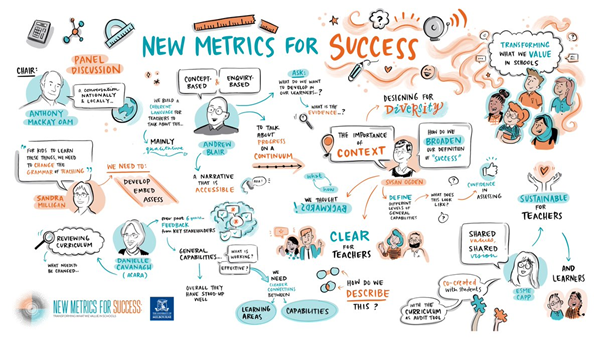
Milligan’s New Metrics for Success project is a collaborative research partnership between The University of Melbourne and 40 ‘first-mover’ schools to create assessment tools, influence the development of policy and accelerate change. In this partnership, leading educators are working with academic experts to reimagine schooling in Australia. With the support of The University of Melbourne, innovative Australian school leaders have established a broad network of institutions that are influencing the wider educational system by sharing evidence of their transformative practices. Their strength is being bolstered by the academic rigor of the university and their validated assessment tools. Leon Furze at Monivae College explains, “Following the University of Melbourne Assessment Research Centre approach for co-designing trusted assessments and credentials, the New Metrics participants are creating assessment frameworks for a range of competencies and capabilities beyond the traditional scope of education.” Moving beyond traditional classroom knowledge and skills, the New Metrics partnership is developing tools to assess eight key areas:
- Connectedness
- Ethics
- Learner Agency
- Communication
- Character
- Citizenship
- Quality Thinking
- Collaboration
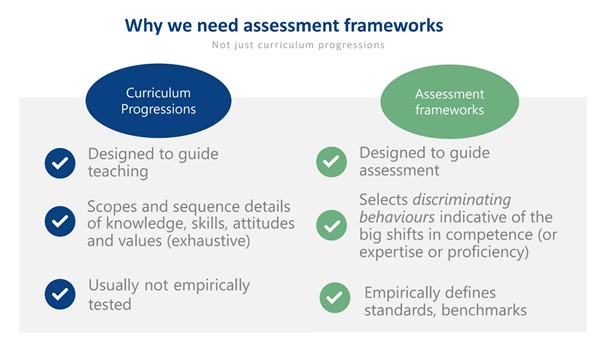
The project is about developing an assessment framework that can be adapted to context and content, and it is the opposite of the standardized testing that has been the norm for the past century. New Metrics participants are enjoying disrupting current practices, and the opportunity to influence policymakers and bureaucrats. It isn’t just about new metrics for learning outcomes, but about new metrics that will shape how we think about school. Kim Bence at Wesley College believes that a new and innovative metric for success will shift the paradigm of education while preparing young people for the next generational challenges. She asserts, “Amid global instability and the emerging importance of digital fluency, the next generation of leaders needs the right frameworks and support structures to feel empowered to make a difference. Developing learner agency and amplifying our young people’s ‘lived experiences’ through re-imaging how we teach them, how they learn, and how we assess is more critical now than ever.”
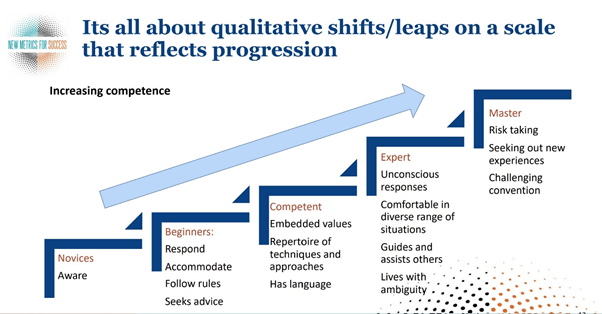
Mirroring growing global educational change movements, the dialogue is accelerating. A recent Australian Learning Lecture paper proposed that:
- Age 15-19 learners are supported to find a line of sight into work or further study that can lead them to a thriving adulthood and build on their unique interests, capabilities and aspirations.
- A Learner Profile is designed to provide a trusted, common way of representing the full range of attainments of young people during their transition years across a broad range of domains.
- Tertiary education providers adopt broader, more transparent entry criteria, design entry pathways and update their admissions processes to better align candidates’ interests, capabilities and aspirations with the educational opportunities on offer, and better reflect evidence about the progress and potential of learners.
In addition, Learning Creates is a new alliance bringing together a range of stakeholders to focus on personalized, passion-based learning as the key to modernizing education and preparing young people for successful futures. There is now an Australian hub for the Mastery Transcript Consortium, an expanding network of schools who are introducing a digital high school transcript for students to have their unique strengths, abilities, interests, and histories nurtured and recognized. Big Picture Learning Australia is transforming education by retiring the traditional ‘appointment learning’ where everyone learns the same things according to a fixed timetable inside the walls of a school.
The Covid pandemic has been a catalyst. The momentum for change is intensifying and it has turned a particular spotlight onto equity issues. Schooling as we know it is set to change irrevocably in multiple ways. The reimagining is underway; the future is personalized. One-size-fits-all no longer fits.
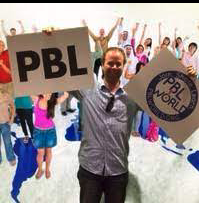

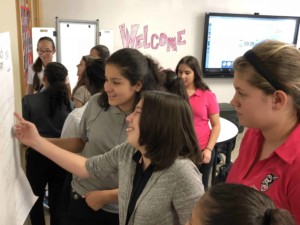

0 Comments
Leave a Comment
Your email address will not be published. All fields are required.